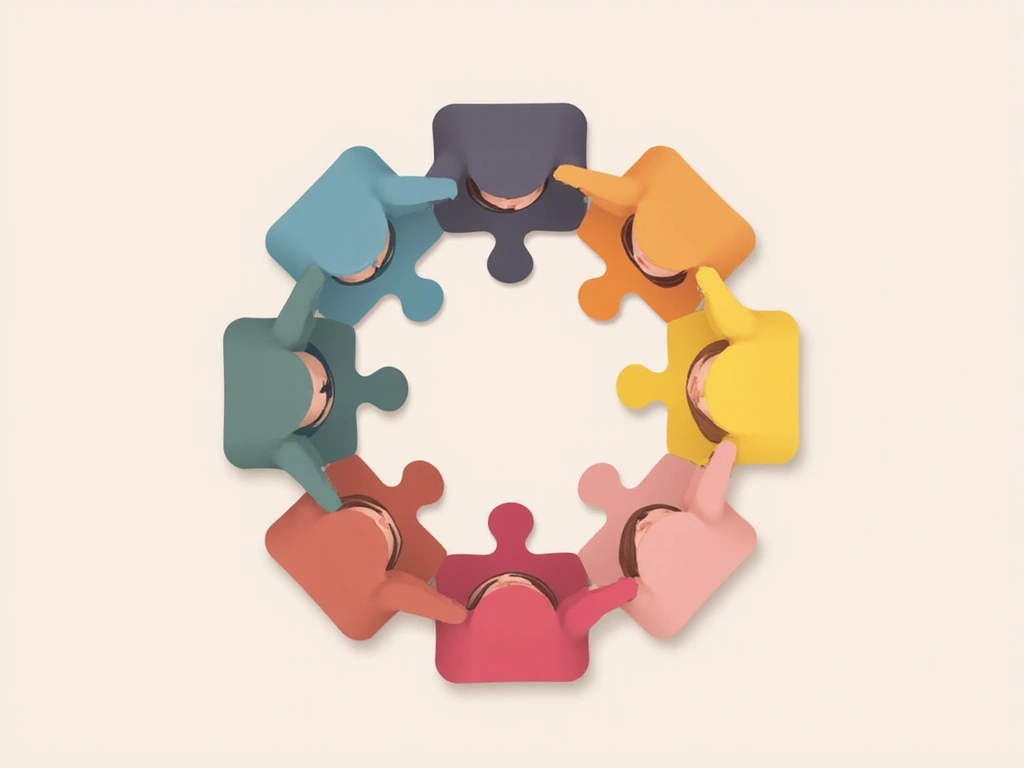Relationship Habits for Stronger Bonds
Nurturing Meaningful Connections
In our fast-paced lives, it's easy to let relationships drift and social connections weaken. However, strong relationships are the bedrock of a fulfilling life, contributing significantly to our mental and emotional well-being. This collection of simple, actionable habits offers a practical guide to intentionally cultivate and strengthen your bonds with partners, family, friends, and your community. By incorporating these habits into your daily routine, you can build a richer, more supportive social network and experience greater overall happiness.
- Focus on daily, manageable actions
- Emphasizes both personal relationships and broader social connections
- Backed by research and expert advice
- Aims to improve both relationship quality and individual well-being
Embrace these habits as small investments in your relationships, yielding significant returns in happiness and connection.
Filter Habits
 Social Connections's Habit Sets
Social Connections's Habit Sets

Join Interest Groups
Join groups focused on hobbies like knitting, hiking, or birdwatching to create natural social bonds. These shared interest environments make conversations flow easily while reducing social anxiety.
Why This Matters
Jeffrey Hall, a University of Kansas professor, emphasizes that having variety in social interactions strengthens your 'social biome.' His research shows that people with diverse social connections experience greater well-being and improved mental health.

Volunteer Regularly
Volunteer at schools, libraries, museums, or animal shelters to connect with like-minded individuals while serving a greater purpose. This creates meaningful relationships built on shared values and mutual aid.
Why This Matters
NIH researchers have found that social connections through volunteering can have powerful effects on health and well-being. Regular volunteers typically experience expanded social networks and improved sense of purpose.

Daily Quality Conversation
Engage in at least one meaningful discussion daily with a friend or family member for mental health support. These deeper exchanges go beyond small talk to create genuine connection and emotional support.
Why This Matters
Jeffrey Hall's research demonstrated that people who had just one quality conversation with a friend each day experienced improved mental health. His studies show these meaningful exchanges provide greater well-being benefits than numerous superficial interactions.

Schedule Partner Time
Set aside small amounts of daily time for your partner to build relationship resilience through consistent connection. Even 15 minutes of focused attention can maintain intimacy amid busy schedules.
Why This Matters
Lia Huynh, a relationship therapist, explains that relationships are like banks where small, regular deposits build resources for harder times. She advises her marriage and couple therapy clients to prioritize these daily investments.

Express Daily Affection
Use everyday language to express love through greetings, goodbyes, and affectionate words to maintain emotional connection. Simple phrases like 'good morning' and 'I love you' set a positive tone for interactions.
Why This Matters
Lia Huynh emphasizes that these verbal expressions, though seemingly small, can make a significant difference in relationship satisfaction. She notes that even in logistical communications, adding affectionate language strengthens bonds.

Notice Partner Positives
Actively look for and verbalize positive traits or actions in your partner to counterbalance negativity bias. This practice increases appreciation while helping partners feel seen and valued.
Why This Matters
Lia Huynh observes that people often focus on their partner's negative traits while overlooking positive ones. She recommends this practice to foster gratitude and maintain a balanced perspective on the relationship.

Daily Physical Contact
Incorporate intentional physical touch like hugs, hand-holding, or a kiss goodbye to maintain physical connection. This non-verbal communication of care requires minimal time but provides significant emotional benefits.
Why This Matters
Research cited in the Times of India article shows that physical touch enhances emotional intimacy and connection. Regular, intentional physical contact releases oxytocin, the 'bonding hormone,' strengthening relationship attachment.

Talk To Strangers
Engage briefly with new people in everyday situations to expand your social comfort zone and create connection moments. These small interactions with baristas, neighbors, or fellow commuters add variety to your social diet.
Why This Matters
Jeffrey Hall's research, featured in Vox, shows that talking to strangers provides novel social inputs that enrich your 'social biome.' He found these interactions often provide unexpected joy and perspective while building social confidence.

Embrace Small Talk
Value brief exchanges as part of your social nutrition rather than dismissing them as meaningless. These casual interactions serve as connection maintenance and can sometimes develop into deeper relationships.
Why This Matters
Jeffrey Hall's concept of the social biome includes appreciating all types of social interactions. He found that even brief exchanges contribute to overall social well-being and can serve as gateways to more meaningful connections.

Give Thoughtful Surprises
Provide unexpected small gestures like bringing home a favorite dessert or leaving a note to show attentiveness. These surprises demonstrate you're thinking about your partner even during routine days.
Why This Matters
The Times of India article explains that these gestures help keep romance alive without requiring special occasions. Couples who practice this habit report feeling more appreciated and maintaining relationship freshness over time.

Discuss Money Together
Have regular, non-judgmental conversations about finances to build relationship trust and alignment. This habit prevents financial secrets and creates shared goals and understanding.
Why This Matters
The Times of India article identifies financial discussion as essential for building a strong foundation in relationships. Couples who regularly discuss money matters report fewer conflicts and better financial outcomes.

Express Regular Gratitude
Verbalize appreciation for specific actions your partner takes, even small ones. This practice counters negativity bias and helps partners feel valued for their contributions.
Why This Matters
Both the CDC and relationship experts note that expressing gratitude strengthens relationships by creating positive feedback loops. Regular practitioners find it increases relationship satisfaction and encourages continued thoughtful behavior.

Send Affectionate Messages
Send brief texts throughout the day to maintain connection during separation. These digital touches express care and keep partners emotionally connected despite physical distance.
Why This Matters
The Times of India article notes that simple texts expressing love or sharing funny moments make relationships more fulfilling. Partners who exchange these messages report feeling more connected throughout the day.

Respect Personal Space
Encourage your partner to take time for themselves and honor their need for independence. This balance prevents codependency while fostering individual well-being.
Why This Matters
The Times of India article suggests that respecting personal space strengthens partnership by allowing individual growth. Couples who practice this report better relationship longevity and less feelings of being smothered.

Use I-Feel Statements
Frame disagreements with 'I feel X because of Y' rather than accusatory language. This communication approach prevents defensiveness while still addressing concerns.
Why This Matters
A Reddit user from r/datingoverthirty explains this helps avoid blame and lashing out during conflicts. Couples who use this technique report more productive conflict resolution and faster emotional recovery.

Choose Similar-Habit Friends
Intentionally spend time with people who already practice habits you want to develop. This social proximity leverages the natural human tendency to mirror those around us.
Why This Matters
The Riskology article on the Social Proximity Effect explains that we naturally mirror the habits of those we spend time with. People who apply this principle report faster adoption of desired behaviors and habits.

Check In Regularly
Reach out to friends with simple check-ins to show you're thinking of them. These brief connections maintain relationships even during busy periods with minimal time investment.
Why This Matters
The CDC emphasizes the power of simple check-ins for maintaining social connections. Regular practitioners find these small gestures prevent relationship atrophy and provide ongoing support networks.

Build Support Network
Create connections with different people who can provide various types of support. This diverse network ensures resilience by not relying on a single person for all your social needs.
Why This Matters
The CDC recommends developing a broad network to create stronger overall support. Those with diverse connections report having appropriate resources for different life challenges.

Ask For Help
Reach out when you need assistance rather than struggling alone. This vulnerability strengthens relationships by allowing others to contribute to your wellbeing.
Why This Matters
The CDC notes that many people find it difficult to ask for help even when needed. Those who overcome this reluctance report stronger relationships and more effective problem-solving.

Offer Support Freely
Provide help to others without waiting to be asked or expecting immediate reciprocation. This proactive support builds relationship credit and community resilience.
Why This Matters
CDC guidance emphasizes the importance of both giving and receiving support. Regular helpers report stronger community connections and often receive support themselves when needed.

Address Conflicts Promptly
Discuss issues respectfully when they arise rather than avoiding uncomfortable conversations. This approach prevents resentment buildup while demonstrating commitment to the relationship.
Why This Matters
The Times of India article notes that addressing conflicts fosters understanding and growth. Couples who practice timely conflict resolution report less relationship stress and faster relationship repair.

Read To Each Other
Take turns reading aloud during routine activities like cooking or before bed. This sharing of stories creates connection through shared experience even during mundane tasks.
Why This Matters
A Reddit user from r/datingoverthirty describes how this habit allowed quality time together even while completing necessary household tasks. Couples who practice this report increased intimacy and enhanced daily routines.

Track Loving Actions
Keep a list of thoughtful things your partner has done to reference during difficult moments. This practice provides perspective during conflicts by reminding you of the relationship's positive aspects.
Why This Matters
A Reddit user explains this helps them understand different expressions of love and provides reassurance during relationship doubts. Regular practitioners report more relationship resilience and faster recovery from disagreements.

Create Financial Independence
Maintain separate 'slush funds' for individual spending while sharing joint accounts for household expenses. This arrangement preserves autonomy while building partnership.
Why This Matters
A Reddit user recommends this system to avoid arguments about personal spending while maintaining financial transparency. Couples using this approach report fewer money arguments and greater relationship satisfaction.

Schedule Morning Cuddles
Set aside specific time before starting the day for physical affection and connection. This habit prioritizes relationship nurturing before daily demands take over.
Why This Matters
A Reddit user describes setting their alarm 15 minutes early specifically for morning snuggling, creating a positive start to the day. Couples who practice this report better mornings and feeling more connected throughout the day.

Exercise With Others
Share physical activities with friends or family to combine social connection with health benefits. Group exercise increases accountability while making physical activity more enjoyable.
Why This Matters
CDC guidance indicates that getting active together can positively affect health habits and create opportunities for connection. Regular participants in group exercise often maintain their routines longer than solo exercisers.

Practice Caregiver Self-Care
Maintain your own health and boundaries while caring for others to prevent burnout and resentment. This balanced approach ensures sustainability of care relationships over time.
Why This Matters
The NIH Social Wellness Checklist emphasizes that caregivers need self-care strategies to maintain their own well-being while supporting others. Those who practice self-care report being able to provide better quality care for longer periods.
Key Takeaways
Here are the key takeaways to help you integrate these relationship-building habits into your daily life:
- Prioritize Quality Time: Make deliberate efforts to spend meaningful time with loved ones, whether it's a daily quality conversation or scheduled partner time.
- Express Affection & Appreciation: Regularly verbalize and show your love through affectionate language, physical touch, and expressing gratitude. Small gestures go a long way.
- Cultivate Open Communication: Establish healthy communication patterns by engaging in non-judgmental financial discussions, using "I-feel" statements during conflicts, and addressing issues promptly.
- Build a Diverse Social Biome: Expand your social circle by joining interest groups, volunteering, and even talking to strangers. Variety in social interactions enriches your life.
- Practice Self-Care in Relationships: Remember to respect personal space, practice caregiver self-care, and ask for help when needed. Healthy relationships require individual well-being.
- Focus on Shared Experiences: Create shared rituals, read together, and share dreams. These shared moments build lasting connection and strengthen bonds.
Start integrating one or two of these habits into your routine today and gradually build upon them. Consistent small efforts will lead to stronger, more fulfilling relationships and a happier, more connected you.



